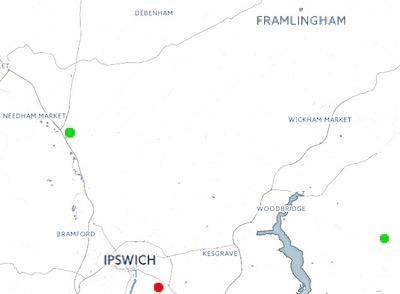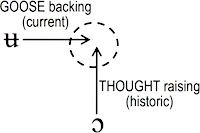People fool in love (extended mix)
(A longer version of my Words of the Week post. The additional material starts here.)
The above video of Ed Sheeran’s song Thinking Out Loud has so far had over 1.25 billion views. Some of its viewers are puzzled by his pronunciation of the line people fall in love in mysterious ways. Here is one contributor to a forum:
…he sings (or atleast it sounds like) “fool” instead of “fall”…
Why does he do that? Is it because he wants to be sing weird and different? Am I crazy or is that the worst thing? ugh it makes me angry just thinking about it.
To which someone replied:
He’s English, so maybe it’s that?
Here’s a clip of the phrase:
Pop singers do sometimes pronounce words in distinctive ways. There’s even an article at Psychology Today in which Siu-Lan Tan suggests various reasons, eg “To define their individual sound, like a sonic signature that makes them distinct.”
But it’s also likely that Sheeran’s English accent is involved. An increasing number of speakers in England, particularly southern England, give fall and fool the same pronunciation. This is visualized beautifully at the Our Dialects site, which is based on fieldwork carried out by Manchester University undergraduates. According to their data on fool and fall, in southern England “29% of speakers pronounce the two words the same.”
Our dialects – FOOL-FALL
Hughes et al. propose that, given its intermediate location between the South West and South East, Southampton features an accent with very distinctive Southern qualities; this is expressed by, amongst other things, a neutralisation of vowels preceding the consonant /l/ (2012: 90).
The site even lets us zoom in to reveal speakers with fool = fall only a few miles from the small Suffolk town of Framlingham where Ed Sheeran grew up (green dots for speakers with fool = fall, red dots for those who differentiate the words):
 Speakers of this type may give the same pronunciation to other words which rhyme with fool and fall. We can hear evidence of this if we listen to Sheeran himself being interviewed. Here he might be saying Pool McCartney:
Speakers of this type may give the same pronunciation to other words which rhyme with fool and fall. We can hear evidence of this if we listen to Sheeran himself being interviewed. Here he might be saying Pool McCartney:
And this might conceivably be These a rule not conventionally attractive people:
but of course he’s saying These are all…
Speakers who give the same pronunciation to fool and fall are merging the GOOSE and THOUGHT vowels before dark syllable-final /l/. How is it that these traditionally dissimilar vowels can merge?
One factor is the phonetically much closer pronunciation of the THOUGHT vowel which contemporary speakers use, compared with the opener quality of accents such as mid-20th century RP and ‘eastern’ General American. That opener vowel is fairly well transcribed by the traditional symbol /ɔː/, but the contemporary realization in southern England is more accurately represented as oː or ʊː. Here is the opener vowel in US English cause from Oxford Dictionaries, followed by the word’s initial portion:
And here is Ed Sheeran using a much closer vowel in the word course, followed by its initial portion:
Another factor is the backing effect of dark /l/ on preceding vowels. In my previous article GOOSE backing, I discussed the GOAT and GOOSE vowels, both of which begin with a central quality unless backed by following dark /l/. Here from the online Cambridge dictionary are code and coal, followed by their initial portions:
And here from the online Collins dictionary are food and fool, followed by their initial portions:
 In other words, the traditional GOOSE symbol /uː/ has long been phonetically inaccurate, but is less inaccurate for the backed allophone which is conditioned by following dark /l/.
In other words, the traditional GOOSE symbol /uː/ has long been phonetically inaccurate, but is less inaccurate for the backed allophone which is conditioned by following dark /l/.
We can hear in that last clip how the backed GOOSE vowel in fool is similar in quality to the close-ish THOUGHT vowel of contemporary fall. Here are the beginnings of Collins’ fool and Sheeran’s course:
Many speakers with homophonous fool and fall consider that both these words contain the THOUGHT vowel. Such a speaker is Shane White, who gave this description of his fool = fall accent in a comment on John Well’s blog:
I am a male, native speaker of RP, born in 1989.
For me, the following are pronounced like so:
rule (as in ‘I wouldn’t rule it out’)
/rɔːl/
ruler (for measuring)
/rʉːlə/
rule (as in ‘He ruled for twenty years’)
/rɔːl/
ruler (= sovereign)
/rɔːlə/
I pronounce school and other words ending in -ool /ɔːl/, making fall and fool homophones, both being pronounced /fɔːl/.
Similarly, tall and tool are also homophones, both being pronounced /tɔːl/.
My father (born 1957) pronounces cool as /kɔːl/ and cooler as /kʉːlə/, whereas I (born 1989) pronounce cool as /kɔːl/ and cooler as /kɔːlə/.
For his unbacked GOOSE vowel, Shane reasonably uses the central vowel symbol /ʉː/ (the CUBE dictionary uses ʉw). Ed Sheeran’s unbacked GOOSE vowel is often even fronter, as we can hear in who was and do that:
Shane uses the traditional symbol /ɔː/ for the THOUGHT vowel of both his fall and his fool. I suspect, of course, that he actually pronounces it with the closer quality I’ve described above, more like oː or ʊː.
The forum contributor that I quoted at the top of this post may well be American, with a relatively open vowel in fall. If so, it’s not surprising that Ed Sheeran’s fall, with its much closer vowel, was heard as fool. I’d be interested to know whether some of the fall = fool speakers in England feel that these two words contain not their THOUGHT vowel but their GOOSE vowel.


This is very interesting. A parallel merge seems to have already completed for many BrE speakers before so-called postvocalic /r/ (or its remnant): pour/poor, tore/tour. Could it be that it’s the “liquid” character of /l/ and /r/ that modifies the preceding vowel?
Similarly, there’s neutralization of tense and lax vowels before liquids: feel/fill before /l/; serious/Sirius before /r/. Perhaps these changes happen not all at once, but in stages in different parts of the system over decades?
Yes, I think you’re completely right. Homophony of pour/pour is well established, homophony of tore/tour isn’t far behind. (My own progressive accent entirely lacks a distinct CURE set.)
The liquids often have vocalic resonance qualities; phonologically, they often seem to ‘blur’ the distinction between syllabic nucleus and coda. Having lost coda /r/, many in southern Britain are losing or have lost coda /l/ (many Scots too). Ed Sheeran, who is very typical of middle class English southerners, has a lot of /l/-vocalization, which I didn’t mention in the article.
Indeed as an American I can only hear Sheeran’s lyric as ‘fool’, which I find semantically appropriate. People do ‘fool’ in love …
In reference to the previous comment I must emphasize that the word ‘poor’ is not a good test case as it’s long had a variant (for rhotic and non-rhotic speakers) with FORCE – I assume this goes back to the same time as ‘door’ and ‘floor’ underwent the same shift. Ditto for moor/Moore. These prevail in the US despite full CURE/FORCE merger being unheard of.
Also on the subject of this song, every source I have seen gives the line of the chorus ‘we found love right where we are’. For me that context would require the perfect ‘_we’ve_ found’, the opposite of the American/British difference you’ve mentioned. Is this a real thing about Sheeran’s dialect or just a mistake?
Yes, this use of simple past is on the rise in Britain, as I said in my article, so it doesn’t surprise me if young Brits like Sheeran are using it, esp. in the American-influenced milieu of popular music. (This is not to say that the conservative use of the perfect has died out in America, you yourself evidently being a case in point. This American ESL page explains the facts in terms of writing and speech, with eg they’ve just left described as “much more commonly used” in writing although they just left occurs in speech.)
It doesn’t seem like the same phenomenon to me: I can say “they just left” or “they’ve just left” with about the same meaning, while in this case the simple past really jars. ‘Maybe we found love …’ suggests that ‘love’ is a physical object you pick up off the floor!
k_over_hbarc at yahoo.com
I think my sister-in-law, who is somewhere on the continuum between nu-RP and MLE, pronounces “-ore/-our” the same as “-al” (except where these words are followed by a vowel, of course). So “carnivore” and “carnival” would be homonyms, both pronounced something like [kɑːnɨvo] or [kɑːnɨvʊ].
I may be missing a length distinction – it turns out to be quite difficult to induce someone into unwittingly saying “carnivore” and “carnival” in the same sentence.
At least one Scot has told me that ‘eagle’ and ‘ego’ are homophones.
Scots of course are known to lack length distinction. In both cases I bet the merged quality is higher than [o]. My syllabic L if it were fully vocalised would be around ‘cardinal [ʊ]’ (the actual FOOT vowel is more central in English), which I suppose is nearly enough the unstressed [u] allophone in five-vowel systems (and possibly in English for some, as the end of ‘menu’).
I am entirely unsurprised if L-vocalisation has spread to Scotland (which I hadn’t heard of before, being American), given that other features have (and many think t-glottaling spread the other way). I wonder if there is a general study of this phenomenon, where _phonetic_ (not grammatical) features spread between firmly distinct accents/dialects (or even languages, as with guttural R).
k_over_hbarc at yahoo.com
L-vocalization was already well established in Scotland when I taught there 25 years ago. This widely publicized article looked at the role of TV.
In this post I discussed the rise of TH-fronting across regions and classes in Britain.
“Last Christmas, I gevv you my heart, but the very next day, you gevv it away.”
In all these years I never noticed how open that monophthong is. Of course Greek has a pretty open /ɛ/ 🙂
I noticed the change in quality of the fool vowel in 1977, when I went to London for the first time. Now I teach that at the Diploma of the Pedagogy of English Phonology at Universidad de San Martín in Buenos Aires.
I know I’m a little late to the party here, but this line has been bugging me for years
“I’d be interested to know whether some of the fall = fool speakers in England feel that these two words contain not their THOUGHT vowel but their GOOSE vowel.”
and this morning I finally had the time and energy to spend a few hours saying “fall” over and over again. And here’s the thing: I think I pronounce fool/fall a secret third way (OK, not secret, but there’s definitely three different vowel sounds between “goose”, “fall”, and “thought”).
If I make up the hypothetical words “thoot” (using the vowel from goose, not the one from foot), and “th*t” (using the vowel from fall), then say “thoot th*t thought” there are three very distinct vowel sounds going on there. Similarly if I make up the words “g*s” (using the vowel from fall and the ‘s’ from goose) and “gaus” (using the vowel from thought and ‘s’ from goose, which ends up sounding like gauze but with a different ‘s’ or coarse but with a ‘g’) then saying “goose g*s gaus” gives three very distinct vowels.
Referring to your vowel chart (https://www.englishspeechservices.com/ipa-vowels/) what I _think_ is happening here is that I’m using /ɯ/ for goose, /o/ for thought, and then something like /u/ (or something somewhere between /u/ and /ʊ/) for fall. But I’m not confident enough in my own ability to hear all these different sounds properly (especially coming out of my own mouth) to know whether I’m along the right lines or if I’ve just got the wrong end of the stick…
What do you think? Have you noticed this in other people (for context I was raised in Wiltshire, but my accent is non-rhotic and I think somewhat similar to SSB) or do you think I’m not accurately picking out the vowel sounds that I’m using correctly?